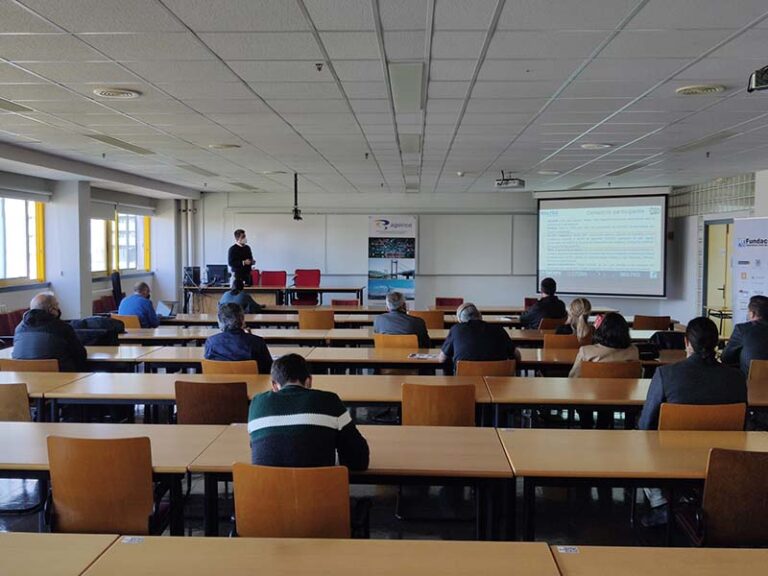- The 3 research projects developed by various consortiums of Galician companies and technology centers make it possible to obtain a lighter but equally resistant concrete to reduce construction costs; optimize the production process of a canned tuna plant or install wind turbines in extreme climates.
A Coruña, Tuesday, March 23, 2021. – The Galician Association of Engineering, Consulting and Technological Services Companies (AGEINCO) has sponsored the conference to present the progress of three research projects of the Conecta-Peme 2018 Program, held this mornig at the Higher Technical School of Civil Engineers, Channels and Ports of A Coruña. Projects that have an accumulated budget of more than 4 million euros, of which 50% is subsidized with ERDF funds, managed by the Xunta de Galicia through the Galician Innovation Agency (GAIN).
EMTYS PROYECT
This project led by TACORE, and with CITEGA, SDEA Engineering Solutions and Soltec Ingenieros as partners, and Anfaco-Cecopesca as the technological center for the scientific support of the project, has developed a Digital Twin of a canned tuna production plant that allows measuring the impact in terms of productivity that the implementation of a thermal multiprocess equipment will have.
EMTYS allows the development of thermal and process simulation tools, applied to the development of a multiprocess equipment, which allows simulating and carrying out the different heat treatments used in the food industry (thawing, cooking, sterilization, pasteurization, blanching, dehydration …). In this way, it is possible to control a great variety of parameters and process them so that, when the characteristics of a product change or you want to introduce a new product, thermal processes can be optimized automatically and with a precision that will be a clear competitive advantage for the sector.
The prototyping and development of the equipment has been based on enabling technologies from Industry 4.0, such as fluid dynamic and thermal simulation, and the simulation of discrete events combining it with virtual reality.
All this, to develop a versatile team that does not exist in the market today, and an implementation methodology in the industry, based on product and process simulation, and the lean Manufacturing philosophy.
MODUL PROYECT
The objective of this project has been to develop technologies that facilitate the implementation of clean energies in remote regions, prepared to operate in an extreme climate through the development of authorized modular systems that allow an autonomous and logistically simple installation.
The MODUL project was born in response to the detected need to reduce the cost of electricity and improve logistics in the installation of renewable energy systems in remote areas of the planet such as Russia, Scandinavia, Alaska, Central Africa or Latin America. This system allows these regions, which currently cover their electrical energy needs with fossil fuels, to use clean energy. An innovative project that will place Galicia in a leading worldwide position in terms of renewable and remote electrification.
Last December the demonstration maneuvers of the set of technologies developed in the MODUL Project, were carried out at the A Pastoriza Experimental Wind Farm. With them, the R & D & i project has been successfully completed, the mission of which has been to develop solutions capable of facilitating the implementation of clean energy in remote or difficult-to-access regions where there is a shortage of logistical means. Among the solutions developed in the project, are the design of prefabricated foundations that are easily transportable to the installation destination, or the execution of a self-raising lattice system capable of allowing the lifting of all the components of the nED100 wind turbine, eliminating the need and the use of cranes for its complete installation.
With this singular installation, the trajectory of innovative actions that will take place in the A Pastoriza Experimental Wind Farm has been inaugurated.
PRET-A-BICO PROYECT
The objective of this project was to develop a high performance lightweight prefabricated partition system, its execution system and instructions for its transport and commissioning. The project began in 2018 and ended successfully in 2020. During its development, numerous characterization tests have been carried out on the materials to be used, the design of the standard partitions and their formwork, as well as the manufacture of prototypes with light-based concrete based on recycled EPS and additives. These prototypes have been placed in an experimental house located in the López Cao plant that has been built using the PRÉT-a-BICO system.
Finally, the specific characterization of the executed partitions has been carried out, evaluating their surface finish, placement and anchoring methodology, acoustic behavior, resistance and suitability for use in buildings. As a result, a technical sheet of the product has been developed for its commercialization.
The project, which has been developed by Construcciones López Cao, Naos 04 Arquitectos and Galaicontrol, makes it possible to speed up work deadlines and reduce construction costs. Unlike brick and plasterboard partitions, PRET-ÁBICO partitions will be marketed with the factory installations and can be placed in the structure phase, which significantly speeds up construction times. It will also have an environmental benefit, since it will avoid many residues from the slashes that are made on the partitions during the finishing phase.




